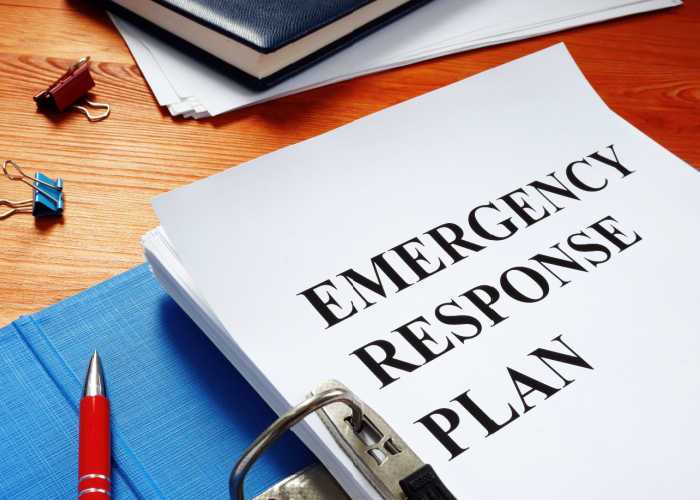Commercial HVAC systems are vital for maintaining a comfortable and safe environment for employees and customers in any business. However, just like any other mechanical equipment, HVAC systems can break down unexpectedly, causing significant inconvenience and potentially expensive repairs.
In this post, we provide a comprehensive guide on how to deal with commercial HVAC emergencies, including how to prepare for them, what to do in the event of an emergency, and how to find professional repair services.
Commercial HVAC systems are designed to work hard, creating the desired conditions in large spaces over prolonged periods. They are not, however, indestructible.
Some of the most common reasons for commercial HVAC breakdown include:
Poor maintenance: lack of regular maintenance and cleaning of HVAC systems can lead to clogged air filters, blocked ductwork and reduced airflow. This can cause the system to work harder than it needs to and overheat in the process.
Electrical issues: HVAC systems rely heavily on electrical components such as motors, compressors and thermostats. Electrical issues such as power surges, short circuits and faulty wiring can damage these components, leading to system breakdowns.
Wear and tear: continuous use of HVAC systems causes wear and tear on components, resulting in system failure over time. Old and outdated systems may also break down due to excessive use or outdated technology.

No matter how well maintained your commercial HVAC system is, emergencies can happen at any time. A sudden breakdown can cause major disruptions to your business operations, leading to lost revenue, productivity and customer dissatisfaction.
That's why it's essential to prepare for HVAC emergencies ahead of time, so you can quickly and efficiently address any issues that may arise.
Create an emergency HVAC contact list: compile a list of emergency HVAC service providers in your area and keep it handy. Include their contact information, availability, and any special instructions for after-hours or weekend emergencies. This will allow you to quickly reach out for professional help when needed and avoid delays in getting your HVAC system back up and running.
Know how to shut down your system: familiarise yourself with the location of the emergency shut off switch for your HVAC system. In case of a major issue such as a gas leak or water leak, knowing how to shut things down correctly can help prevent further damage and ensure safety.
Be mindful of energy use: during extreme weather conditions, such as heat waves or cold snaps, be mindful of your energy use and avoid overloading your HVAC system. Avoid setting the thermostat to extreme temperatures, and use energy-saving settings or features to reduce the strain on equipment.
Have alternative heating or cooling options: in case of a prolonged HVAC system outage, have alternative heating or cooling options available, such as space heaters, fans, or portable air conditioners. This can provide temporary comfort until your HVAC system is repaired.
If and when an emergency situation does arise, the first step is to identify the problem. Some common commercial HVAC issues include a lack of heat or cool air, poor airflow, strange noises, or unusual smells.
If the issue is related to heating or cooling, check the thermostat settings, the air filters, and the circuit breaker to make sure they’re all functioning correctly. If the problem is related to ventilation, inspect the ductwork and make sure it’s not obstructed.
In identifying the problem, avoid attempting any DIY repairs or using makeshift solutions that can be dangerous or further damage your HVAC system.
In some cases, it may be necessary to shut off the HVAC system to prevent further damage or safety hazards. For example, if there is a gas leak, a burning smell, or strange noises, it’s best to turn off the system immediately.
Always consult the manufacturer’s instructions on how to do this correctly, and if in any doubt contact an HVAC technician for advice.
When selecting an HVAC contractor, be sure to choose a reputable company with qualified and experienced technicians. This will ensure they’re able to diagnose and repair the problem promptly and safely.
Make sure they have all the relevant certificates and that they hold accreditations with recognised governing bodies. If you’ve made a list of emergency HVAC contacts as we recommend, you should have a number of reputable contractors to turn to.
In the event of a commercial HVAC emergency, it’s important to communicate with employees and customers about the situation. Let them know what’s happening, what steps are being taken to resolve the issue, and when the HVAC system is expected to be back in operation.
If necessary, consider temporarily closing the business or relocating to a different location until the problem is resolved. This can help ensure the safety and comfort of everyone involved.
Finally, it’s important to take the appropriate steps to avoid any future HVAC emergencies.
Consider investing in planned preventative maintenance with your chosen contractor. This will keep your system running to maximum efficiency, and with regular servicing you can identify any potential issues before they become major problems.
At LAC we provide professional and reliable HVAC services, including emergency call-out and repair in Loughborough and the surrounding areas.
Our team of qualified and experienced technicians can diagnose and repair all types of HVAC problems, ensuring minimal downtime and maximum efficiency for your business. Contact us today to learn more about our emergency repair services and how we can help keep your commercial HVAC system running smoothly.
